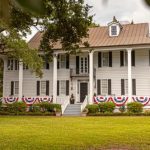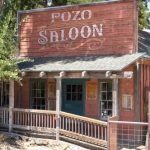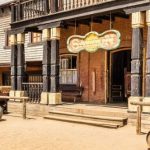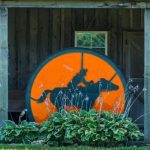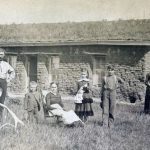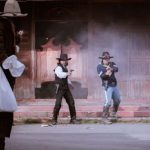 Crime
Crime  Crime
Crime  Animals
Animals The Animal Kingdom’s 10 Greatest Dance Moves
 Movies and TV
Movies and TV 10 Box Office Bombs That We Should Have Predicted in 2025
 History
History 10 Extreme Laws That Tried to Engineer Society
 History
History 10 “Modern” Problems with Surprising Historical Analogs
 Health
Health 10 Everyday Activities That Secretly Alter Consciousness
 History
History Top 10 Historical Disasters Caused by Someone Calling in Sick
 Animals
Animals 10 New Shark Secrets That Recently Dropped
 Movies and TV
Movies and TV 10 Forgotten Realities of Early Live Television Broadcasts
 Technology
Technology 10 Stopgap Technologies That Became Industry Standards
 Crime
Crime 10 Dark Details of the “Bodies in the Barrels” Murders
 Animals
Animals The Animal Kingdom’s 10 Greatest Dance Moves
 Movies and TV
Movies and TV 10 Box Office Bombs That We Should Have Predicted in 2025
Who's Behind Listverse?

Jamie Frater
Head Editor
Jamie founded Listverse due to an insatiable desire to share fascinating, obscure, and bizarre facts. He has been a guest speaker on numerous national radio and television stations and is a five time published author.
More About Us History
History 10 Extreme Laws That Tried to Engineer Society
 History
History 10 “Modern” Problems with Surprising Historical Analogs
 Health
Health 10 Everyday Activities That Secretly Alter Consciousness
 History
History Top 10 Historical Disasters Caused by Someone Calling in Sick
 Animals
Animals 10 New Shark Secrets That Recently Dropped
 Movies and TV
Movies and TV 10 Forgotten Realities of Early Live Television Broadcasts
 Technology
Technology 10 Stopgap Technologies That Became Industry Standards
10 Hilariously Strange Slang Terms Popular in the Old West
Just like every time period and subculture, the Old West was populated with people who used a certain vernacular. Mostly uneducated and entirely rough around the edges, people in the Old West didn’t speak like more refined Easterners. Even the ones who came out and found fortune in gold, or land grabs, or cattle drives didn’t have the elite financial or social sensibilities of their more civilized countrymen back on the East Coast. And they talked in such a way as to match that rough-and-tumble lifestyle.
As such, slang was a big part of life in the Wild West. (Believe it or not, zoomers and millennials, other people have been using slang terms since long before your generational cohorts were born and raised!) So, in this list, we’ll take a fun and funny look at ten hilarious slang terms that were popular in the Old West. After you read this list, we just ask one thing: start using these terms in your everyday life and see if they catch on among your friends and family!
Related: 10 Ways Childhood Really Sucked in the Old West
10 High-Falutin’

People in the Old West looked down upon others who thought they were too good for everybody around them. And it makes sense, right? The frontier wasn’t a place where country clubs existed, and elites rubbed elbows with each other at expensive dinners and boring parties. So, anybody who came in acting self-important and pompous got a dressing down from the rougher cowboys and cattle rustlers that were around on the Great Plains and the mountain mesas! And that’s where the phrase high-falutin’ came into play.
Basically, high-falutin’ means when someone is acting in a way that is self-important, pompous, fancy, or otherwise (usually undeservedly) highbrow. Some have speculated that the slang term has a Dutch foundation in the word verlooten, meaning “stilted.” However, this is likely a folk etymology rather than a verified origin. The actual roots of the word remain unclear. So, the next time you have a friend who is getting too big for his britches or perhaps feeling his oats a little too much, bring him back down to earth by calling him high-falutin’![1]
9 Backdoor Trots
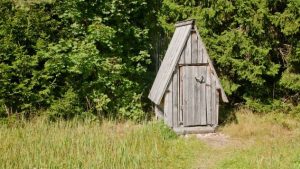
Good food was hard to come by out on the frontier. Sometimes, you might get lucky and have the provisions to make a hearty meal for yourself and your fellow cowboys and cattle rustlers. But other meals came down to whatever you had on hand that you could manage to cook and eat. Maybe you could kill a wild hare or somehow get hold of a snake to skin and cook over the fire. Or perhaps you just had a little bit of strong and disgusting coffee to drink to wake you up after a night sleeping out under the stars next to your trusty horse. But in either case, what often came up after a rugged meal out on the range was, well, diarrhea. Sorry, there’s just no other way to say it.
With lots of questionable foods and inconsistent meals out on the frontier, diarrhea was pretty much a fact of life for nearly everyone. It was so common, in fact, that it had its own slang term: the backdoor trots. Whenever somebody felt that unfortunate aspect of nature calling, they trotted out to relieve themselves through their, uh, backdoor. Hopefully, they trotted far enough away from the rest of the group so as not to disturb everyone else. And hopefully they trotted downwind…[2]
8 Prairie Stuff!

The Wild West was all about the prairie, so as you might expect, tons of slang terms had to do with prairies and related things. After all, it was what cowboys were faced with traversing, living on, and working in for pretty much every day of their adult lives. So, it makes perfect sense that it’d pop up… a lot! Take the term “prairie coal” for example. That one, which was also interchangeable with “prairie pancakes,” referred to dried cow manure. Sounds gross, but dried cow manure was critical as a tool to help fuel fires. Just like an old-school version of charcoal! And without other ways to light up the flames late at night when the cold set in, prairie coal was critical.
Other prairie-inspired slang terms included things like “prairie oysters.” Those are calves’ testicles, which were meant to be eaten and could come either fried or roasted. Today, people know them as Rocky Mountain oysters—and they are surprisingly a very popular food! Another term was “prairie dew.” It wasn’t dew on the grass like you may be thinking, though. That was a slang euphemism for whiskey! The drink of choice among cowboys and settlers had its own subtle slang term. And finally, there was the “prairie tenor.” Don’t imagine an opera singer with that moniker, though. It was actually a coyote! With coyotes doing all the high-pitched howling out on the expansive tracts of land, settlers eventually named them for the singers that they were. Clever![3]
7 Four-Flusher
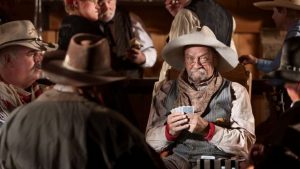
If you’re a poker player, you certainly know what they call five cards in all one suit: a flush! And if you have a flush, chances are you’ve got a pretty darn good hand. Even better if you’ve got the royal flush, of course. But what if you’ve only got four cards in one suit? Well, then, you have a whole lot of nothing. Close but no cigar, as it were. Back in the Old West, people actually had a name for that kind of poker hand: a four-flusher. In time, that name was used so widely and recognized by so many settlers that it came to become a slang term for other things, too!
In the Wild West, a “four-flusher” meant a couple different things. For one, it meant somebody who was bluffing at cards, claiming to have a big hand while actually having nothing of value. However, over time, it also came to be used as a synonym for a liar, a trickster, a con artist, or a person of questionable integrity. People who were viewed as deceitful, full of hot air, or long on boasts and promises while being short on delivering actual results were called four-flushers. Come to think of it, this is a term that needs to make its way back into the lexicon. Goodness knows there are plenty of four-flushers around these days![4]
6 Cattywampus
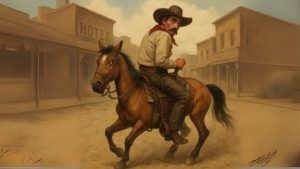
The term cattywampus has a few different spellings. Nobody can quite agree on how it’s supposed to be spelled or even pronounced. Still, at least everybody can agree on its meaning: back in the Old West and elsewhere across America, it was used to denote when something had gone askew or awry. Basically, if something looked screwed up and wrong, it was cattywampus! (Or however you prefer to spell it; some enterprising souls claim that it’s “catawampus,” while others insist on “catiwampus.”)
As for the etymology of the word, it was first used as an adverb (as in “cattywampusly”) in the United States in the middle of the 1830s. It then gained widespread popularity after that and made its way west with the pioneers, where it became a staple for all kinds of people. Some have claimed that Charles Dickens used “catawampus” in Martin Chuzzlewit, but that appears to be a myth. Regardless, the term had already gained popularity in American English. So, the next time things are going wrong, or something is a little off-kilter, call it for what it is: cattywampus![5]
5 California Widow

The term California widow is maybe one of the most creative ones on here. See, when the Old West was being won, men from the East Coast and the Deep South trekked out west to stake their claim to some land and hope to strike it rich. Some got into farming, others worked in the fledgling cattle industry, and many went all the way to California to prospect for gold. It was that last group that was used to coin the term “California widow.” Many of those men left their wives behind on the East Coast while they went out looking to secure their family’s future somewhere along the new frontier!
Technically, the term “California widow” was first intended to describe a woman who was separated from her husband but not yet divorced. They were living separate lives, and both had moved on from each other. But as the Wild West became a key point in the minds of many Americans, it came to indicate a woman whose husband had gone west, leaving her behind. That is, she was a “widow” to the man’s pursuit of riches in California (or wherever he ended up in the West). If the man was lucky, and if he survived the arduous odyssey out West, he’d send for his wife at some point, and she’d come out with him. If he were unlucky or disreputable, well, she’d become a real widow soon enough…[6]
4 Guttersnipe
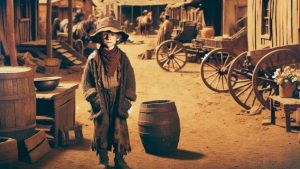
During the middle and late 19th century, the term “guttersnipe” was used to denote the presence of young children who lived on the streets and were often homeless. They would frequently be seen lying in gutters, under store overhangs, or somewhere else where they could find some sort of respite. The most common urban term used for them in places like New York City was “street urchin.” Soon, with Wall Street as a reference point, some people even started to develop a more polite euphemism for it: “streetcorner broker.” Either way, these poor, orphaned, and homeless children were seen as menaces who gathered up paper, rags, trash, and whatever else they could keep for themselves from the gutters.
In turn, the slang term went west with the rest of America through the latter half of the 19th century. While western saloon towns and cowboy settlements obviously weren’t anywhere near as urban and built up as New York City, the presence of homeless people drifting and wandering around with practically nothing to call their own was still prevalent. The term “guttersnipe” was far more common in Eastern urban areas, but it may have been recognized in the West as part of the broader vernacular of the time.[7]
3 Barkin’ Stuff
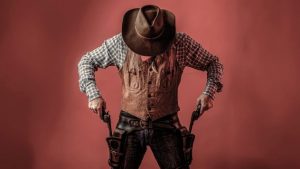
Similar to what we’ve already learned with the term “prairie” and the many slang offshoots that involved that word, “bark” was another very common word used in the Old West. In several cases, it was put into other words and phrases to create new slang terms and ways to describe certain facts of life on the frontier. The most unsettling of those, though, was just the word itself. To “bark” somebody meant that you were scalping them. For a while, scalping was a legitimate concern for travelers crossing the Great Plains. Hostile Indigenous groups didn’t take kindly to wagon trains and strange men encroaching upon their land. So, they would scalp, or “bark,” settlers during altercations and battles.
Aside from that, the word had other meanings, as well. Take the phrase “barkin’ at a knot,” for one. That meant a couple of different things, including when someone was doing something useless or attempting something impossible. It could also mean when someone was blabbering without any sense of when or how to stop talking. Basically, if you were “barkin’ at a knot,” you were wasting your time in one way or another. And then there were barking irons! As you might guess by the context clues, barking irons were… pistols! So, to avoid getting barked out on the prairie, you’d better have had your barking irons with you! [8]
2 Toad Strangler
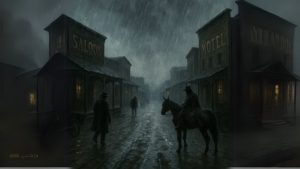
What do you call it when there’s a very quick and suddenly very heavy thunderstorm materializing over your head? If you were a Southerner two centuries ago and then a Westerner moving across the vast expanse of the frontier, you’d call it a toad strangler! Also sometimes known as a “toad choker” and other things of similar terminology, a toad strangler is what old-school Westerners called a very quick, very heavy rain. It would get here in a flash, dump a ton of violent sheets of rain in a short time, and be gone just as quickly.
As far as the etymology of the term is concerned, its roots, as we mentioned, actually hail from the Deep South. It was used frequently in places like Arkansas and Louisiana to describe fast-moving, torrential downpours. However, by the late 19th century and into the early 20th century, it became a phrase used regularly on the frontier. Newly arriving Texans, Oklahomans, and more took the phrase on and alerted their neighbors to the dangers of toads being, um, strangled by sudden deluges of water from the sky. Yee haw?[9]
1 Words for Whiskey
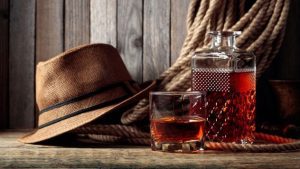
If you know anything at all about the Old West, you know that people back then absolutely loved to drink. Going down to the saloon and getting plastered while playing cards, meeting with the visiting “painted ladies,” and then getting into a sloppy drunken shootout were all practically rites of passage for men in the Wild West. As such, they created a ton of slang terms for whiskey and other forms of alcohol.
With whiskey specifically, Westerners knew it by names like dust cutter, disturbance promoter (yes, really), scamper juice, bug juice, and a popular Irish whiskey that they called just plain old “Number 9.” There was also Red Eye, which was a strong and poor-quality whiskey. There was Old McBrayer, which was a bitter Kentucky sour mash whiskey. And there was rock and rye, which was a bottled drink made out of rye whiskey, rock candy, and—when they could find it—leftover fruit.
Our favorite whiskey term, though, has got to be “forty rod.” A rod is 16.5 feet (5 m), so forty rods equals 660 feet (201.2 m), or about one-eighth of a mile. Forty rod was very cheap and very strong whiskey. It was so strong, in fact, that it was said to either give the drinker the speed and courage to walk that full forty rods or, conversely, knock them flat on their butts. Either way, we like it. Do you guys want to go out back, drink some forty rod, and then see if we can walk the distance?[10]
